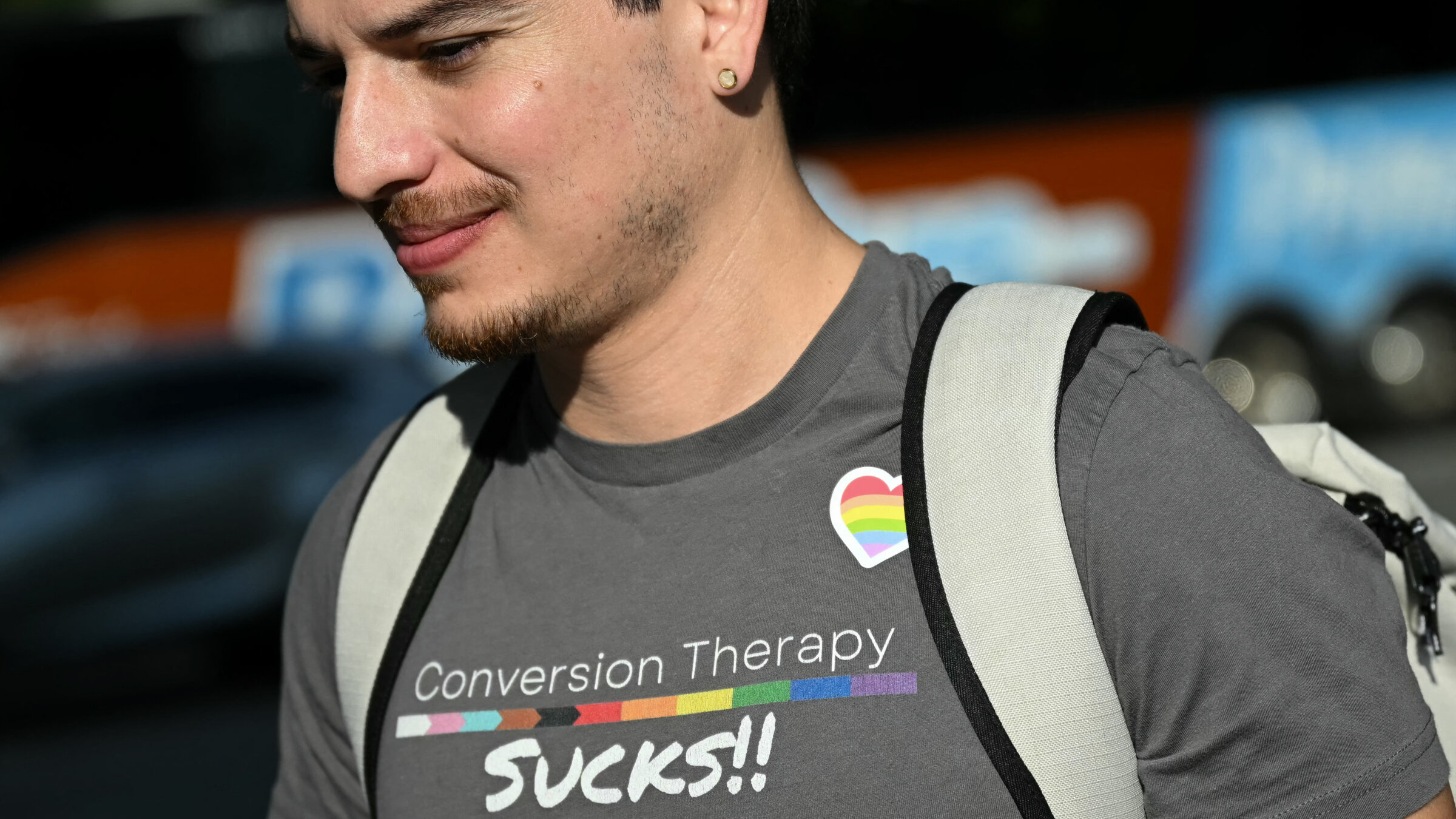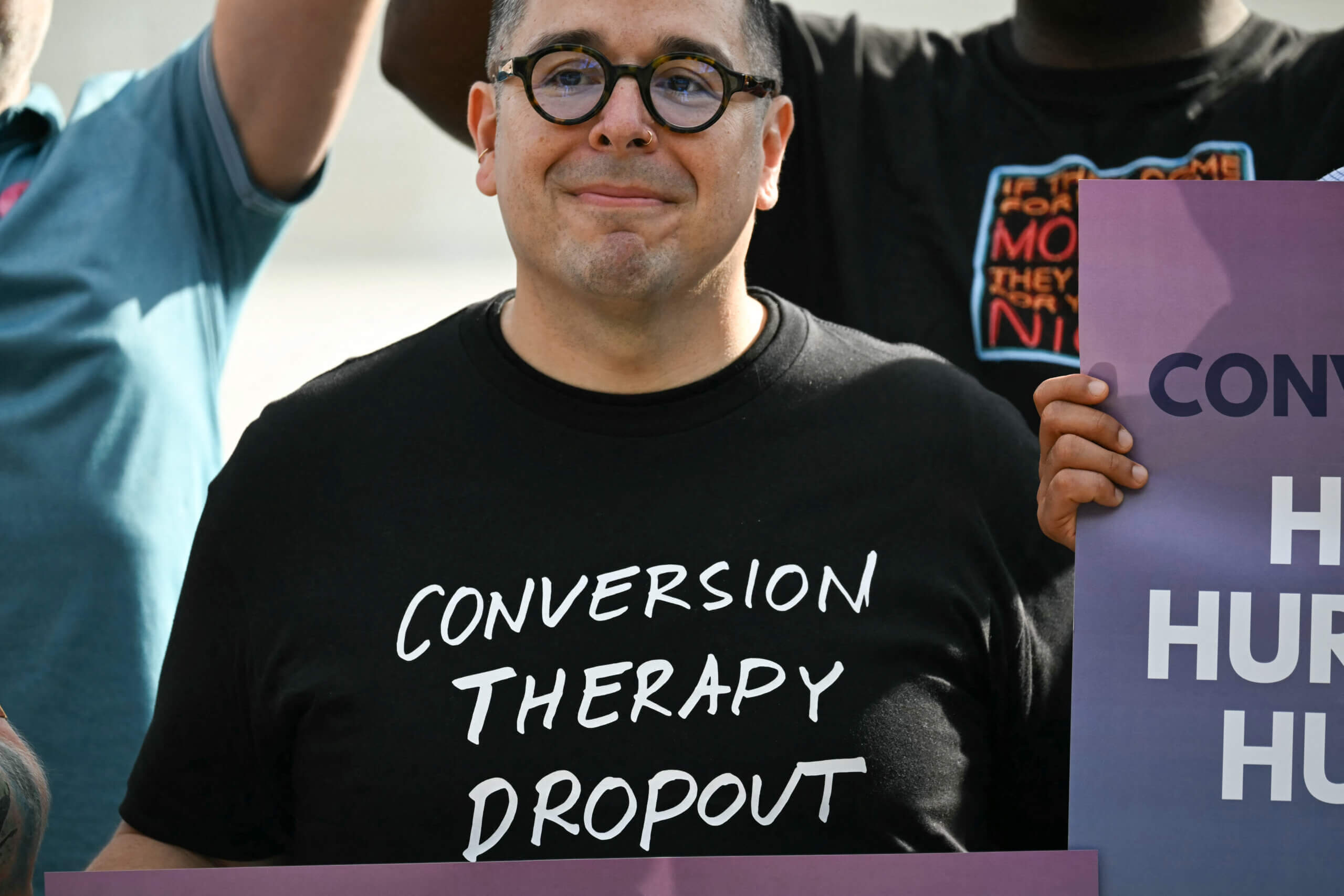‘Conversion therapy is having a moment’ — what will that mean for LGBTQ+ Jews?
The Supreme Court is poised to greenlight a practice that has harmed many young, queer religious people

A man wears a shirt reading “conversion therapy sucks” outside the US Supreme Court as the Court hears oral arguements in Chiles v. Salazar, a landmark case on conversion therapy, Oct. 7. Photo by Andrew Caballero-Reynolds/AFP via Getty Images
The Supreme Court dove into the culture wars again this week by hearing arguments on conversion therapy — a controversial pseudoscientific practice that attempts to change LGBTQ+ patients’ sexuality to align with heterosexual desires. In Chiles v. Salazar, Kasey Chiles, an evangelical therapist in Colorado, is alleging that Colorado’s conversion therapy ban violates her 1st Amendment rights, leaving her unable to work with patients who want to live a life “consistent with their faith.”
Conversion therapy is not solely an evangelical Christian problem. In 2012, a group of plaintiffs in New Jersey successfully sued a group called Jews Offering New Alternatives to Homosexuality, alleging that it had committed consumer fraud by selling services that it claimed could turn someone heterosexual. The organization, known as JONAH, promised religious Jews that they could change their sexual orientation via methods that included being forced to strip naked and beat pillows that represented their mothers.
When JONAH was forced to disband after losing in court in 2015, it reformed just 11 days later as a new organization called the Jewish Institute for Global Awareness. In 2019, a judge found this was a violation of the original court order and shut down JIGA as well. Yet conversion therapy in the Orthodox world persists to this day. One new organization, Jewish Family Forever, led by Dr. Koby Frances, claims that “modern ideologies are leading people away from their values,” and its website prominently states that they are “encouraging Torah traditional heterosexual marriage.”
Chaim Levin, one of the plaintiffs who sued JONAH, is now a first-year law student at Drexel University and has been a vocal advocate for LGBTQ+ Jews.
I spoke with Levin, who was raised in a Chabad household in Brooklyn, over the phone about Chiles v. Salazar, and how the Orthodox community currently navigates homosexuality. Our conversation has been edited for length and clarity.
Can you share what your conversion therapy experiences with JONAH were like?
I had been seeing a frum therapist in Flatbush since I was 15 for several reasons, including being gay. She actually was helpful for some of those other issues. But when I was older, and finally “acting out” on my attraction to men, she said she couldn’t help me anymore.
Two weeks before I turned 18, I talked to the director of JONAH after being referred to them by a rabbi. I then went on my first weekend retreat with them shortly after my 18th birthday, and was with JONAH for about a year and a half to two years.
There was bullying, there was nudity. There was staged humiliation, where they would have us recreate traumatic experiences. There was what they called “healthy touch,” which was where typically older men cuddled with younger men as a form of “father-son bonding” — in hindsight, a very sexualized experience.
The incident that ultimately caused me to leave and to sue JONAH was when my life coach forced me to get naked and fondle myself in front of him, after I repeatedly said I did not want to.
What was your first reaction when you heard SCOTUS was taking up a case on conversion therapy?
I’m a legal nerd and a law student, so I knew it was coming. I knew that federal courts disagreed on this issue. Conversion therapy is having a moment now. It’s a resurgence driven by panic and hysteria over trans people. I’m feeling incredibly frustrated, to be honest.
Why is that?
It’s unclear how conversion therapy bans are enforced. I actually don’t know of a single example of a ban being enforced. They’re a symbolic gesture, and many advocacy groups pushed for them and spent millions of dollars to get them passed. All it did was to drive conversion therapy underground.
No person offering conversion therapy is going to call it that. They’ll offer treatment for “sex addiction,” “men’s issues,” or “intimacy issues.” All the conversion therapy bans are also solely targeting licensed medical professionals. There are specific carveouts for religious counseling and life coaches, so this practice is unfortunately still thriving.

In Chiles v. Salazar, the prosecutors are presenting conversion therapy as a free speech issue. They argue that there is a difference between the speech of a medical professional versus their conduct. In their view, simply discussing or supporting a hypothetical patient’s desire to become straight is not harmful. How do you see this argument?
It’s a really good question: is it speech, or is it conduct?
In my case, the life coach told me to take my clothes off and touch myself as part of my conversion therapy. He wasn’t doing anything himself, but he was inducing me to engage in that conduct. I found out that another witness for JONAH had the same life coach as I did, and he ordered him and another man to masturbate each other to the point of orgasm. Is that solely speech?
As a future lawyer, I almost have a little bit of sympathy for the prosecutor’s arguments. Yet I don’t believe any of these people are genuinely concerned for the well-being of queer people. They’re pushing an agenda.
How do you think the Orthodox Jewish community has evolved (or not) on homosexuality and conversion therapy in the last decade since your lawsuit?
I want to be sensitive. But I don’t believe that it’s a safe place for gay or queer people. I certainly am not going to tell people to leave the community. I don’t think that’s the answer.
But a community can only be as safe as it wants to be. There are still tons of therapists and life coaches in the Orthodox community offering conversion therapy. Their rabbis don’t want to deal with the problem of queer people.
I think JQY and Eshel are amazing and doing important work. But those organizations are not what I would classify as being in the mainstream. It’s not for lack of trying — they have turned into some of the only safe spaces for LGBT Jews given the climate we’re living in.
Do you buy the free speech, or free practice of religion, arguments when it comes to the conversion therapy you see still happening in the Orthodox world?
I don’t think free speech means you are absolved from consequences. I think people can be held accountable.
The thing I’ve encountered a lot with these conversion therapy providers is that they don’t claim they’re using religion in their counseling. I’ve always heard: “We’re a Jewish group, we’re religious people, but our therapy is not religious.” If you’re going to tell me “our therapy is prayer,” that’s one thing, but I’ve never seen conversion therapy in the form of prayer.
I just don’t buy it. You can’t use your religion to harm people in a way that doesn’t comport with reality. You don’t have a religious or constitutional right to hurt people.

















